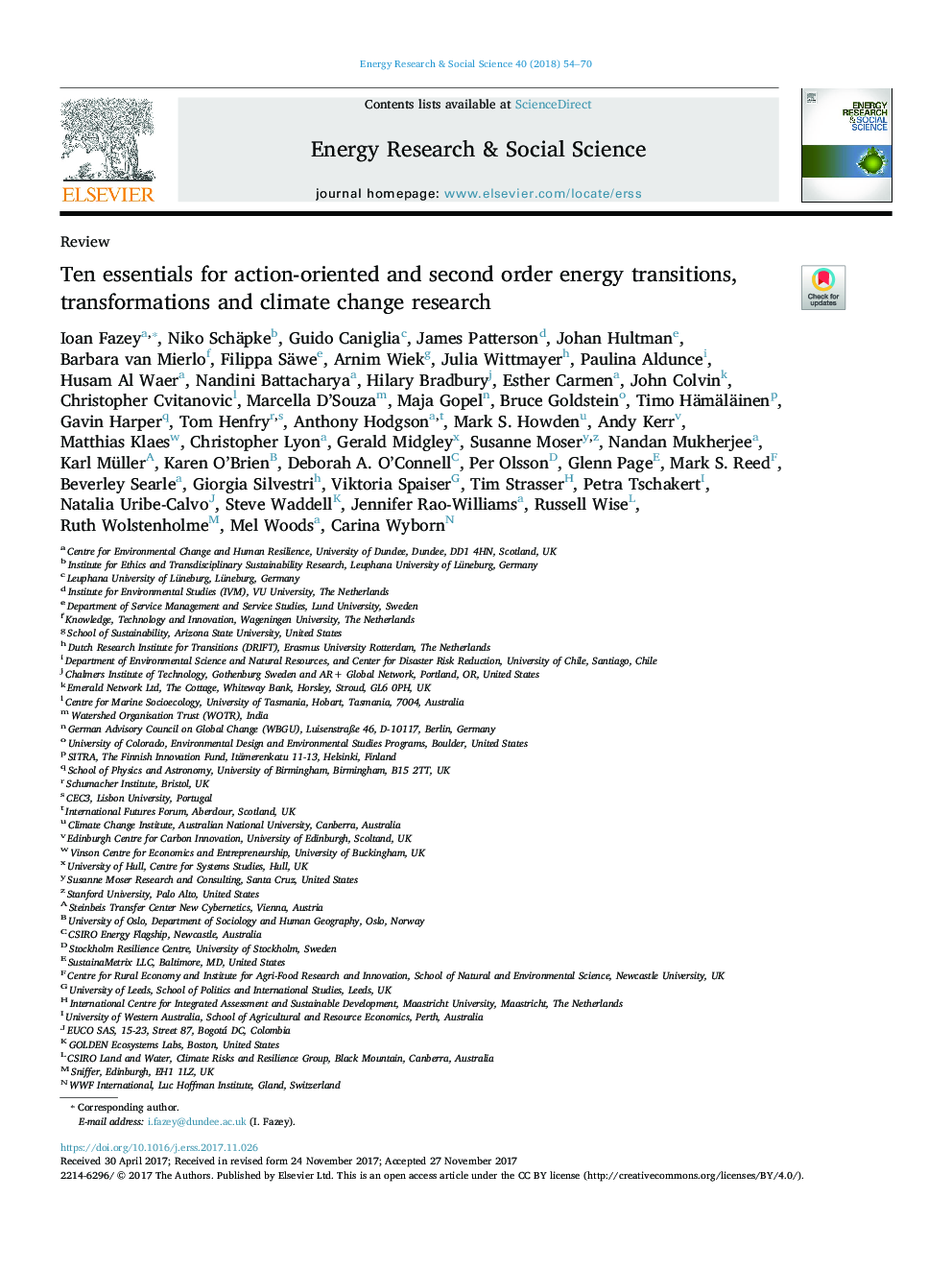| کد مقاله | کد نشریه | سال انتشار | مقاله انگلیسی | نسخه تمام متن |
|---|---|---|---|---|
| 6557507 | 1422561 | 2018 | 17 صفحه PDF | دانلود رایگان |
عنوان انگلیسی مقاله ISI
Ten essentials for action-oriented and second order energy transitions, transformations and climate change research
ترجمه فارسی عنوان
ده اصل ضروری برای انتقال انرژی، تحولات و تحولات اقلیمی بر مبنای اقدامات گرا و مرتبه دوم
دانلود مقاله + سفارش ترجمه
دانلود مقاله ISI انگلیسی
رایگان برای ایرانیان
کلمات کلیدی
تربیت دینی، پایداری، تحقیق عملی، انتقال پایدار،
ترجمه چکیده
مهمترین سوال برای تحقیق در مورد آب و هوا دیگر مربوط به مشکل نیست، بلکه در مورد چگونگی تسهیل تغییرات تحولاتی که لازم است برای جلوگیری از تغییرات ناشی از تغییرات آب و هوایی فاجعه بار ایجاد شود. با این حال، پاسخ دادن به این سوال، نیاز به ارتقای گسترده تحقیقات است که می تواند به سرعت در حال یادگیری در مورد تغییرات باشد. بنابراین، ده اصل ضروری برای هدایت تحولات عمل گرا و تحقیقات انرژی ارائه شده است، در ارتباط با علم دوم مرتبه. آنها عبارتند از: (1) تمرکز بر تحولات به زندگی با ضعف کربن، انعطاف پذیر؛ (2) تمرکز بر فرایندهای راه حل؛ (3) تمرکز بر "چگونه" دانش عملی؛ (4) تحقیق رویکرد از طریق درون سیستم دخالت می کند؛ (5) کار با جنبه های هنجاری؛ (6) تلاش برای تفکر کنونی بیش از حد باشد؛ (7) رویکرد چند گانه ای را برای درک و تغییر شکل گرفتن به کار گیرید. (8) ارزش نقش جایگزین محققان را تأیید می کند؛ (9) تجربیات مرتبه دوم را تشویق کنید؛ و (10) بازخورد داشته باشید. استفاده مشترک از ملزومات تحقیقات بسیار انطباقی، انعکاسی، همکاری و تاثیرگذاری را ایجاد می کند که قادر به افزایش ظرفیت پاسخگویی به چالش های آب و هوایی است. با این حال، در حال حاضر، تمرین چنین رویکردهایی محدود و محدود است با غلبه بر رویکردهای دیگر. برای تحولات وسیع تر به سیستم های زندگی و انرژی کم کربن رخ می دهد، بنابراین تحولات در روش تولید و استفاده دانش نیز مورد نیاز خواهد بود.
موضوعات مرتبط
مهندسی و علوم پایه
مهندسی انرژی
انرژی (عمومی)
چکیده انگلیسی
The most critical question for climate research is no longer about the problem, but about how to facilitate the transformative changes necessary to avoid catastrophic climate-induced change. Addressing this question, however, will require massive upscaling of research that can rapidly enhance learning about transformations. Ten essentials for guiding action-oriented transformation and energy research are therefore presented, framed in relation to second-order science. They include: (1) Focus on transformations to low-carbon, resilient living; (2) Focus on solution processes; (3) Focus on 'how to' practical knowledge; (4) Approach research as occurring from within the system being intervened; (5) Work with normative aspects; (6) Seek to transcend current thinking; (7) Take a multi-faceted approach to understand and shape change; (8) Acknowledge the value of alternative roles of researchers; (9) Encourage second-order experimentation; and (10) Be reflexive. Joint application of the essentials would create highly adaptive, reflexive, collaborative and impact-oriented research able to enhance capacity to respond to the climate challenge. At present, however, the practice of such approaches is limited and constrained by dominance of other approaches. For wider transformations to low carbon living and energy systems to occur, transformations will therefore also be needed in the way in which knowledge is produced and used.
ناشر
Database: Elsevier - ScienceDirect (ساینس دایرکت)
Journal: Energy Research & Social Science - Volume 40, June 2018, Pages 54-70
Journal: Energy Research & Social Science - Volume 40, June 2018, Pages 54-70
نویسندگان
Ioan Fazey, Niko Schäpke, Guido Caniglia, James Patterson, Johan Hultman, Barbara van Mierlo, Filippa Säwe, Arnim Wiek, Julia Wittmayer, Paulina Aldunce, Husam Al Waer, Nandini Battacharya, Hilary Bradbury, Esther Carmen, John Colvin,
